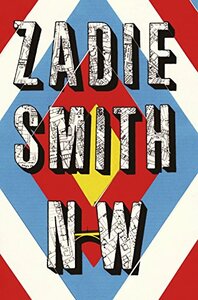You need to sign in or sign up before continuing.
Take a photo of a barcode or cover
This highly experimental, metamodernist novel follows a number of characters across both time and space. It covers themes of identity, race and class whilst navigating the landscape of London. I highly enjoyed the various forms of experimental writing, and how it influenced the pace and structure of the narrative. The number of intertextual references, a recurring theme in Smith's oeuvre, was especially interesting. However, the ending unfortunately fell flat for me in comparison to the rest of the story.
This book got better and better as it went on, and then it was over. The first section was difficult for me because of the formatting/fonts being odd and distracting. After I got through that part, I was less distracted by the book itself and able to get more involved/care more about its characters, which now, having finished the book, I want to know more about.
challenging
emotional
reflective
medium-paced
Plot or Character Driven:
Character
Strong character development:
Yes
Loveable characters:
Yes
Diverse cast of characters:
Yes
Flaws of characters a main focus:
Yes
challenging
reflective
medium-paced
Plot or Character Driven:
Character
Loveable characters:
Complicated
fascinating and complicated book. stylistic changes in the different parts were interesting, interesting to mix background noise and exposition together so fluidly, made it hard to understand at first but once you get it it flows. love some weird women tbh.
dark
reflective
slow-paced
Plot or Character Driven:
Character
Strong character development:
Yes
Loveable characters:
No
Diverse cast of characters:
No
Flaws of characters a main focus:
Yes
Took a while but i figured I should prob write a review:
I think Zadie Smith hits the nail on the head when it comes to the experience of growing up poor in inner city London and how there are so many paths to go down (most of them dead ends) ; even if you leave the area you’re from or achieve social mobility - it’ll never leave you and will always be in the fabric of your being. It hit too close to home with characters so vivid I feel like I knew them myself. I think the characters all being in their 30s was also really impactful for me: I’m already starting to feel how people who were the same can’t be anymore as time goes by but knowing that it’ll be felt 10x stronger in years to come is strange. Hearing stories of people who were starry eyed, promising, some of the most intelligent and brilliant people i’ve known not ‘make it’ or end up stuck in the cycle of poverty is something I know could happen in future - knowing it could be me…
I never really felt how impactful social class would be to the way i navigate my professional life (and I’m sure I’ll feel it in my person life too soon enough) but I think Smith shares the opinion that that, especially in the UK, class is the defining identity. It’s interesting how two people who have known each other for years in Leah and Natalie/Keisha can lose the ability to understand one another because one person achieved social mobility and the other hasn’t. Even despite the fact that they were different in so many ways: in race, personality, interests, social groups - Natalie marrying into an affluent family and becoming a successful lawyer was what severed their relationship in a way? When I think about my friends and the fact that we have so many shared experiences in the way we grew up in east London, just life Natalie and Leah, it really breaks my heart that that understanding and connection to each other that growing up the same forges could be completely lost when the end result becomes clear. If some of us are doctors and lawyers and others are still stuck in the cycle…
I think what is missing in Smith’s narrative that my friends and I are blessed to have is the understanding of Islam and the ties that shared religion forges. Leah and Natalie can’t have that - my friends and I can and inshallah we will.
The ending with Nathan and Natalie was my favourite part of the book. Being lost or in a hard place in life and ending up on the estate you grew up on as someone who is successful in the dunya with a boy who had popularity and social clout in school but ended up on the streets and addicted to drugs really hit me - when I compare it to my own life it’s so strange that people who were cool in primary or secondary school are now in jail or trapping whilst I went to a good school and a good university and now have a good job? Strange that that was a path my life could’ve taken…we were the same at a point…they were ahead of me - it could’ve been me. I think that survivors guilt never really leaves you in a way when you grow in a rough area. Zadie Smith captured it all perfectly…so so perfectly! Real Londoners
I think Zadie Smith hits the nail on the head when it comes to the experience of growing up poor in inner city London and how there are so many paths to go down (most of them dead ends) ; even if you leave the area you’re from or achieve social mobility - it’ll never leave you and will always be in the fabric of your being. It hit too close to home with characters so vivid I feel like I knew them myself. I think the characters all being in their 30s was also really impactful for me: I’m already starting to feel how people who were the same can’t be anymore as time goes by but knowing that it’ll be felt 10x stronger in years to come is strange. Hearing stories of people who were starry eyed, promising, some of the most intelligent and brilliant people i’ve known not ‘make it’ or end up stuck in the cycle of poverty is something I know could happen in future - knowing it could be me…
I never really felt how impactful social class would be to the way i navigate my professional life (and I’m sure I’ll feel it in my person life too soon enough) but I think Smith shares the opinion that that, especially in the UK, class is the defining identity. It’s interesting how two people who have known each other for years in Leah and Natalie/Keisha can lose the ability to understand one another because one person achieved social mobility and the other hasn’t. Even despite the fact that they were different in so many ways: in race, personality, interests, social groups - Natalie marrying into an affluent family and becoming a successful lawyer was what severed their relationship in a way? When I think about my friends and the fact that we have so many shared experiences in the way we grew up in east London, just life Natalie and Leah, it really breaks my heart that that understanding and connection to each other that growing up the same forges could be completely lost when the end result becomes clear. If some of us are doctors and lawyers and others are still stuck in the cycle…
I think what is missing in Smith’s narrative that my friends and I are blessed to have is the understanding of Islam and the ties that shared religion forges. Leah and Natalie can’t have that - my friends and I can and inshallah we will.
The ending with Nathan and Natalie was my favourite part of the book. Being lost or in a hard place in life and ending up on the estate you grew up on as someone who is successful in the dunya with a boy who had popularity and social clout in school but ended up on the streets and addicted to drugs really hit me - when I compare it to my own life it’s so strange that people who were cool in primary or secondary school are now in jail or trapping whilst I went to a good school and a good university and now have a good job? Strange that that was a path my life could’ve taken…we were the same at a point…they were ahead of me - it could’ve been me. I think that survivors guilt never really leaves you in a way when you grow in a rough area. Zadie Smith captured it all perfectly…so so perfectly! Real Londoners
recommended by: https://www.nytimes.com/2018/03/05/books/vanguard-books-by-women-in-21st-century.html
adventurous
challenging
emotional
sad
tense
slow-paced
Plot or Character Driven:
Character
Strong character development:
Complicated
Loveable characters:
Complicated
Diverse cast of characters:
Yes
Flaws of characters a main focus:
Complicated
Whew what a tome. Loved the formal experimentation, loved the prose, loved the weighty realism of the characters.




